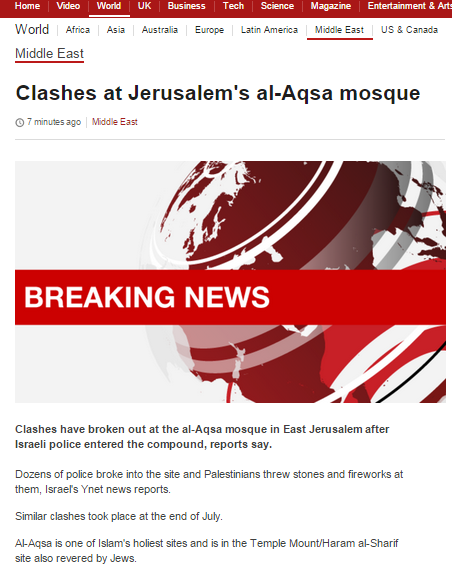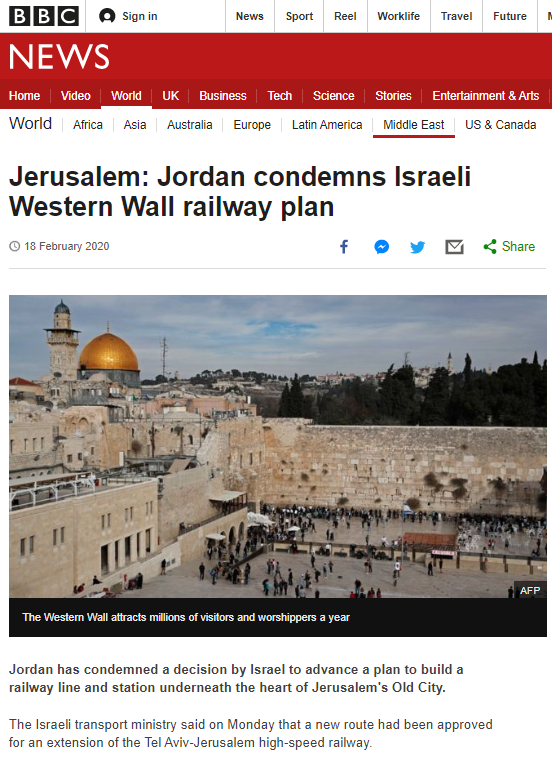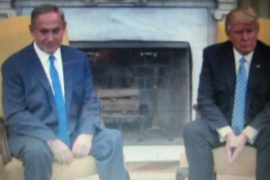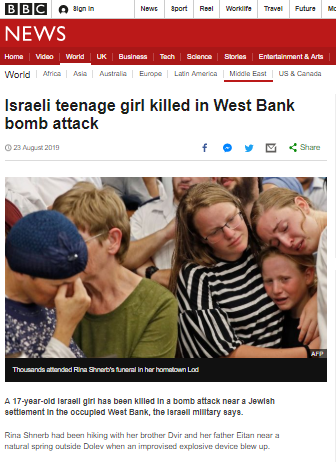Readers no doubt recall that a couple of months ago the BBC produced some unsatisfactory reporting (see related articles below) on the topic of violent riots on Temple Mount which were instigated in order to disturb visitors to the site on Tisha B’Av. On the eve of Rosh HaShana (New Year), a similar incident took place at the same site and the BBC’s reporting showed little improvement.
The BBC News website published an article on its Middle East page on September 13th which was originally headlined “Clashes at Jerusalem’s al-Aqsa mosque” and currently goes under the title “Jerusalem’s al-Aqsa mosque sees Israeli-Palestinian clashes“.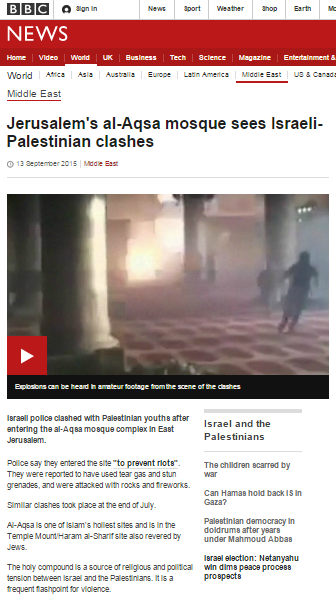
The timeline of the events described in that BBC report was explained as follows by the Israeli police:
“During the night pipe bombs were seized in an apartment in east Jerusalem in a joint operation by the central [police] unit of the Jerusalem district and the Israel Security Agency. In addition, intelligence was received concerning masked individuals who barricaded themselves inside Al Aqsa Mosque during the night.
The barricaders collected stones and fireworks and put up barriers to prevent the closing of the entrance door to the mosque which included metal poles, planks, ropes and more, with their intention being to clash with the security forces and to disturb visits to Temple Mount. The Jerusalem police force prepared for entry to the [Temple] Mount area […]
The police force […] surprised the barricaders and entered the Temple Mount area this morning with the aim of enabling the commencement of visits to the site. Immediately with the entry of the forces the rioters ran away into the mosque and began throwing stones and [concrete] blocks at the policemen as well as firing fireworks directly at them. During the operation pipes suspected as being pipe bombs were seized and removed from the site by a police bomb disposal expert.
The security forces […], operating while rocks, fireworks and metal poles were being thrown at them, removed the barriers and gained control of the rioters. Visits to the [Temple] Mount area are now taking place as usual.”
In other words, this was yet another attempt (continuing, by the way for the third consecutive day at the time of writing) by violent rioters to disturb visits to Temple Mount on a Jewish holiday. So how did the BBC describe the incident?
The article has undergone numerous changes (viewable here) since its initial publication. Early versions clearly suggested to readers that the violence was the result of the entry of the police into the compound, with no mention made of the intentions of the rioters and their prior organisation of pipe bombs and other objects intended to be used as weapons.
The article’s second version included the following opaque statement:
“Tensions have been running high since Israel Defence Minister Moshe Yaalon last week banned two Muslim groups which confront Jewish visitors to the compound.”
That statement was slightly expanded in later versions: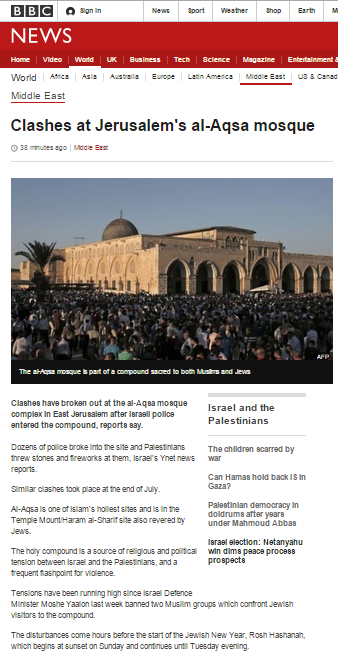
“Tensions have been running high in the city since Israel Defence Minister Moshe Yaalon last week banned two Muslim groups which confront Jewish visitors to the compound.
Mr Yaalon said the groups were the main sources of tension and violence at the site and said banning them was necessary to public order.”
As has been noted here on numerous occasions, the BBC has consistently failed to report on the topic of the salaried agitators who harass non-Muslim visitors (not just Jewish ones, as claimed in this report) to Temple Mount. It is therefore highly unlikely that readers of that sentence would understand how those “Muslim groups” – the Murabitat and Murabitun – disturb public order or why they were recently outlawed.
All versions of the article fail to clarify to readers that Temple Mount is the holiest site in Judaism.
“Al-Aqsa is one of Islam’s holiest sites and is in the Temple Mount/Haram al-Sharif site also revered by Jews.”
Only in the third version of the report did BBC audiences begin to get any inkling of the background to the story.
“Officers had been searching for a number of Palestinians who were believed to have hidden explosive devices in East Jerusalem, the Jerusalem Post reported. The suspects had escaped to al-Aqsa mosque and barricaded themselves in, the newspaper said.”
Only in the fifth version of the report were audiences made aware (by means of second-hand quotes) of the context of the intention to disturb visits to the site.
“Police were quoted in the Israeli media as saying the Palestinian youths who had barricaded themselves into the mosque were planning disruption to prevent Jews visiting the site.
Security forces launched a surprise raid at around 06:45 (03:45 GMT) in the hope of opening the site as planned, Haaretz newspaper reports.
The police said in a statement that masked youths within the mosque “threw stones and fireworks” and that pipe bombs had been found.”
Of course those who read the report’s earlier versions were deprived of that context seeing as visitors to the BBC News website have no way of knowing that an article they have already read has been updated.
From version six of the article onwards it was deemed appropriate to give unqualified amplification to a statement which clearly detracts from audience understanding of this story rather than contributing to it.
“Palestinian President Mahmoud Abbas condemned what he called an “attack by the occupier’s military and police against the al-Aqsa mosque and the aggression against the faithful who were there”.”
The real story here is the continued attempts by Palestinian agitators to disturb visits to a site of significance for members of three religions – particularly at the time of Jewish holidays. In this particular incident the storage of pipe bombs at a holy site clearly represents a serious escalation which is not adequately clarified to audiences in the BBC’s report. Notably too, the BBC passed up on the opportunity to correct its previous long-standing omission by beginning to report on the organised groups which hassle non-Muslim visitors to Temple Mount and the funding behind them.
This story was also the subject of a radio report which will be discussed in a future post.
Related Articles:
BBC News twists Tisha B’Av Temple Mount incident with ‘last-first’ reporting
More misleading BBC reporting on Tisha B’Av Temple Mount rioting
BBC amendments to Tisha B’Av Temple Mount rioting report

